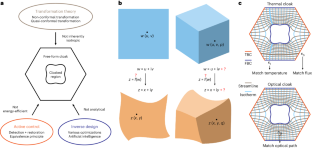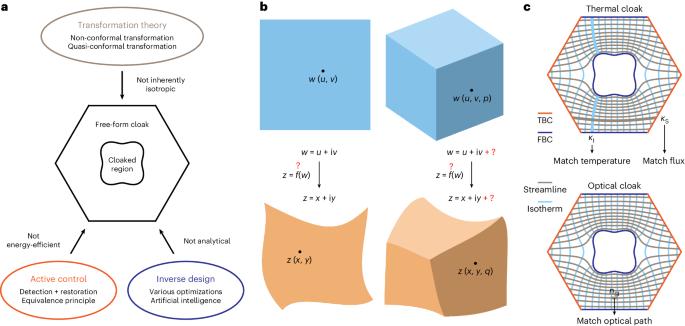Free-form and multi-physical metamaterials with forward conformality-assisted tracing
IF 12
Q1 COMPUTER SCIENCE, INTERDISCIPLINARY APPLICATIONS
引用次数: 0
Abstract
Transformation theory, active control and inverse design have been mainstream in creating free-form metamaterials. However, existing frameworks cannot simultaneously satisfy the requirements of isotropic, passive and forward design. Here we propose a forward conformality-assisted tracing method to address the geometric and single-physical-field constraints of conformal transformation. Using a conformal mesh composed of orthogonal streamlines and isotherms (or isothermal surfaces), this method quasi-analytically produces free-form metamaterials using only isotropic media. The geometric nature of this approach allows for universal regulation of both dissipative thermal fields and non-dissipative electromagnetic fields. We experimentally demonstrate free-form thermal cloaking in both two and three dimensions. Additionally, the multi-physical functionalities of our method, including optical cloaking, bending and thermo-electric transparency, confirm its broad applicability. Our method features improvements in efficiency, accuracy and adaptability over previous approaches. This study provides an effective method for designing complex metamaterials with arbitrary shapes across various physical domains. Here a conformality-assisted tracing method is proposed to devise free-form and three-dimensional conformal metamaterials, featuring accuracy and efficiency in handling complex geometry and adaptability to various diffusion and wave fields.


采用前向保形辅助追踪技术的自由形态和多物理超材料。
变换理论、主动控制和反向设计已成为创建自由形态超材料的主流。然而,现有框架无法同时满足各向同性、被动和正向设计的要求。在此,我们提出了一种正向保形辅助跟踪方法,以解决保形变换的几何和单物理场约束。该方法使用由正交流线和等温线(或等温面)组成的共形网格,仅使用各向同性介质就能准分析地生成自由形态超材料。这种方法的几何性质允许对耗散热场和非耗散电磁场进行通用调节。我们在实验中演示了二维和三维自由形态热隐形。此外,我们的方法还具有多种物理功能,包括光学隐形、弯曲和热电透明,这证实了它的广泛适用性。与之前的方法相比,我们的方法在效率、准确性和适应性方面都有所提高。这项研究为在各种物理领域设计具有任意形状的复杂超材料提供了有效方法。
本文章由计算机程序翻译,如有差异,请以英文原文为准。
求助全文
约1分钟内获得全文
求助全文

 求助内容:
求助内容: 应助结果提醒方式:
应助结果提醒方式:


